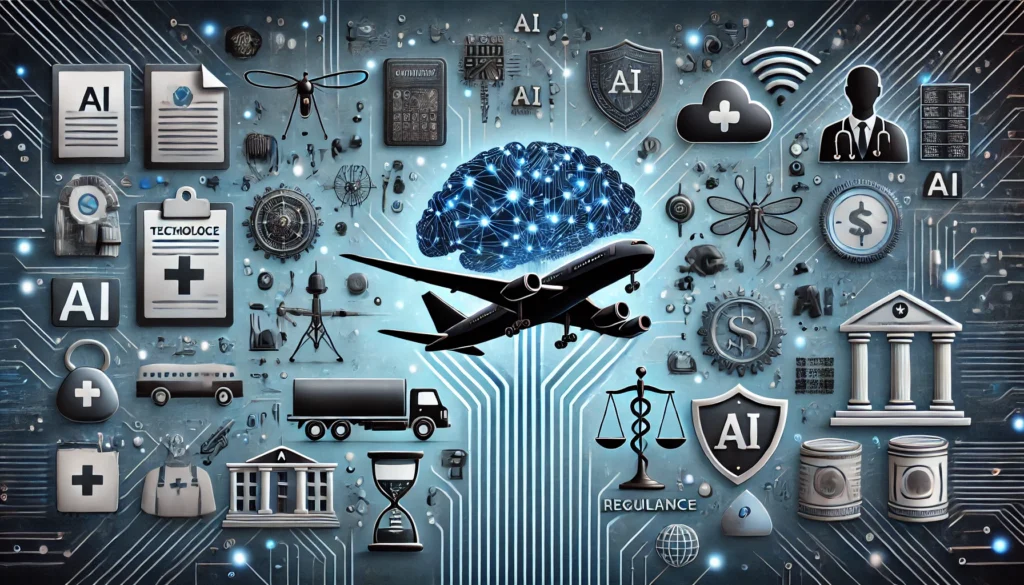
AI LLM Advancements in the Last 5 Years
Over the past five years, large language models (LLMs) have redefined the boundaries of artificial intelligence, evolving from experimental tools to indispensable assets across industries. These powerful AI systems, trained on vast datasets, have demonstrated unprecedented abilities in natural language understanding, content generation, and complex problem-solving.
From the release of groundbreaking models like OpenAI’s GPT series to cutting-edge advancements in multimodal AI, LLMs have rapidly expanded their capabilities, impacting fields as diverse as healthcare, education, software development, and creative industries. As we explore this technological evolution, it becomes clear that LLMs are not just the future of AI—they are already shaping our present in profound ways.
Use Cases for Regulated Industries
One of the most promising yet challenging frontiers for LLMs lies in regulated industries such as healthcare, finance, and aerospace. These sectors are governed by strict compliance standards, privacy regulations, and safety protocols, making AI integration more complex. Despite these hurdles, LLMs are proving to be invaluable in assisting with regulatory compliance, streamlining documentation, and enhancing decision-making processes.
In healthcare, for example, LLMs can analyze patient data while ensuring HIPAA compliance, support medical research by synthesizing vast amounts of clinical data, and aid in the development of personalized treatment plans. In finance, they can help with fraud detection, risk management, and regulatory reporting.


Meanwhile, in aerospace and defense, LLMs are being leveraged for designing more efficient systems, automating safety protocols, and supporting complex simulations and operational decisions. As these models continue to advance, their role in regulated industries will expand, offering both innovation and the tools to maintain strict oversight and compliance.
Requirement Management
For more specific aspects to how AI can be implemented we can talk about requirements management. In all regulated industries, requirements play a large role ensuring and controlling the product created meets the intended function. Everything created should be based off the requirement set such as design, test cases, test procedures, code, hardware design etc..
With requirements being text based in most cases, this makes them a good application for LLMs to augment engineers capabilities in this area. The following are some examples where LLMs could apply:
- Evaluate Requirements Meet the Program Standards
- Suggest Requirement Wording
- Derive Requirements from Prototypes
- Evaluate Requirement Sets for Gaps
Testing

Testing is an area with development that is very necessary to ensure the product functions the way it should. It’s one of the many important processes in development that reduces errors.
A good testing program identifies more than just errors in the final product, it also identifies:
- Ambiguous Requirements
- Requirement Gaps
- Inconsistencies in Design
- Unwanted Functionality
Who Likes Testing?
People typically like the creative part of a process. When creating a product this fits into the development part of the cycle. When it comes to testing it is not considered the most creative part of the process. It’s hard to find people that like testing. This is evident when companies outsource or subcontract testing.


It also takes a detail oriented person to test to ensure all cases are covered. When testing products and code for instance to Modified Conditions/ Decision Coverage criteria it can be meticulous and monotonous to cover all the required test cases.
In Addition to testing being boring and monotonous, it’s typically one of the most expensive parts of the process sometimes even costing as much as twice the cost of development.
Generative AI is a great application here where the latest LLMs are capable of generating Test Cases and even Test Procedures if given enough information to be able to generate a valuable product.
This could lead to large savings by using AI to create the artifacts that people avoid doing or don’t enjoy

Peer Reviews
Peer reviews are a critical component of regulated industries, ensuring that products, processes, and systems meet stringent standards for safety, quality, and compliance. In fields like aerospace, healthcare, and finance, where lives, security, and financial stability are at stake, peer reviews provide an essential layer of oversight. They help identify potential risks, validate results, and maintain regulatory compliance, ultimately driving continuous improvement and trust in high-stakes environments. By involving experts from multiple disciplines, peer reviews ensure that no detail is overlooked, fostering accountability and robust decision-making.
Standards and Templates
Large Language Models (LLMs) can significantly enhance peer reviews in regulated industries by automating and streamlining key aspects of the process. Here are some ways LLMs can augment peer reviews:
- Document Analysis and Summarization: LLMs can quickly analyze vast amounts of technical documentation, regulations, or research papers, summarizing the key points for reviewers. This speeds up the review process and helps focus on critical issues.
- Error Detection: LLMs can identify inconsistencies, potential errors, or deviations from regulatory standards within documents or code. This assists reviewers in detecting subtle mistakes that might be missed through manual review alone.
- Knowledge Augmentation: LLMs can provide real-time access to industry-specific knowledge, past cases, or best practices, offering reviewers helpful insights and data-driven suggestions. This improves the quality and depth of peer reviews.
- Bias Reduction: By applying LLMs to highlight possible biases or overly subjective judgments in the review process, companies can ensure that reviews remain fair and objective, leading to more robust and compliant outcomes.
- Enhanced Collaboration: LLMs can serve as a communication bridge, generating clear, structured feedback or suggested revisions, improving the quality of discussions between team members and external experts involved in the review process.
In regulated industries, where precision and compliance are paramount, LLMs act as powerful tools, assisting peer reviewers in making more informed, accurate, and efficient assessments.
